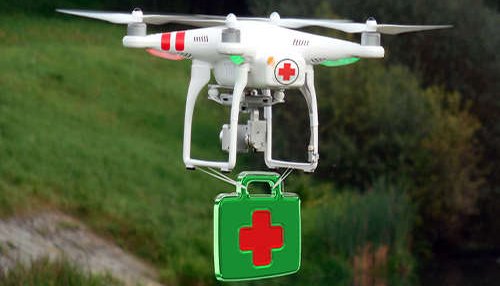Some Patients at the New Tafo Government Hospital in the Eastern Region have expressed satisfaction in regards to the delivery of the first medical supplies package by the medical drone service to the hospital. Â
The New Tafo Government Hospital in the Eastern Region has become the first hospital in the country to receive emergency medical supplies from Zipline’s drone delivery network ahead of Wednesday’s April 24, 2019, official launch of the programme by President Akufo-Addo.
According to reports, items of the first drone delivered today April 23, 2019, were polio vaccines for newborns and yellow fever vaccines for children from seven years and above.
Again, reports indicated that it would have taken a normal vehicle about 3 hours to deliver the products but it took the drone 30 minutes to get to the new Tafo government hospital.
A test flight process was carried out at the first emergency medical distribution centre at Omenako in the Eastern Region.
In an interview with Starr News, some patients expressed satisfaction with the test flight process and delivery of the first package
''I think its a good initiative because sometimes we are told there are no donors to donate blood in the hospital and when you go to the blood bank you are told no blood is available. This initiative could save the lives of other relatives even if not mine''.
''Critically, sometimes when you need those items it takes time to get them but if the drones can give us those items within five to ten minutes, I think its good to the health delivery system,'' another patient added.
Background
The drones and delivery service are built and operated by Zipline, a California-based automated logistics company, which helped launch the world’s first national drone delivery service in Rwanda in October of 2016. The medical drone delivery service has been so successful at decreasing waste, increasing access and saving lives that the government of Rwanda recently asked Zipline to quadruple the size of its operation there.
The drones will not replace the existing supply chain. They will specialize in handling emergency stock out situations. Ghana’s emergency medical drone delivery service will save tens of millions of Cedis by eliminating the need for expensive emergency trips to pick up the product, and by avoiding wasteful overstocking of product at health facilities. This revolutionary healthcare service will help save lives, decrease waste in the system and increase healthcare access for more than 14 million people nationwide.
The drone delivery network, which will be run by the Ghana Health Service and the Ministry of Health, will give Ghana one of the most advanced health care supply chains on the planet.
The drones will operate 24 hours a day from 4 distribution centres across the country. The first distribution centre will be located near Suhum. The sites for the remaining 3 will be finalized by Ghana Health Service (GHS) subsequently, but are expected to cover much of the country.
The distribution centres will stock 148 lifesaving and essential medical supplies including emergency blood and oxytocin to save women’s lives in childbirth postpartum haemorrhage which is the leading cause of maternal death, emergency medicines for surgeries, severe infections, antivenins and anti-rabies, diabetic emergencies, extremely high blood pressure emergencies. When one of the 2,500 health facilities covered by the new service stocks out of a product, it will order an emergency delivery by a drone that will arrive in 30-40 minutes.
Also, Zipline will employ 200+ Ghanaians, including pharmacists, engineers, flight operations, etc. Each distribution centre will include at least 20 drones, launch and recovery equipment, state-of-the-art medical refrigeration equipment, computerized order management systems. Each will be staffed by up to 50 Ghanaian employees.
Â
 READ ALSO:
Â
visit primenewsghana.com for more ghana news





